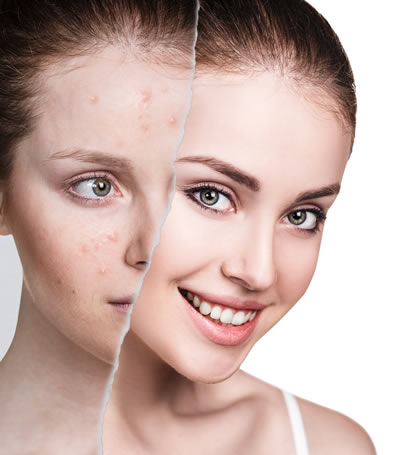We're all aware of the indispensable benefits of daily sunscreen, from thwarting premature aging to shielding against skin cancers. Yet, many wonder if using sunscreen will worsen their acne. At LaserLux Aesthetics, we provide a wide selection of services for our clients, including hydrafacial and laser hair removal. If you’re worried about sunscreen due to acne breakouts, keep reading for tips that can help you find the ideal sunscreen for your skin type.

Acne is a complex skin condition that arises from multiple factors coming into play including oil production, dead skin cells, clogged pores, and bacteria. While acne predominantly affects the face, it can also appear on the back, chest, and shoulders. Hormonal changes, stress, certain medications, and even diet can exacerbate acne. Different types of acne range from minor whiteheads and blackheads to more severe forms like nodules and cysts. Recognizing the root cause and type of acne is crucial for effective treatment.
Sunscreen's primary role is to protect your skin from the harmful effects of ultraviolet radiation. This radiation can accelerate skin aging and increase the risk of skin cancers. Sunscreen achieves this by either absorbing, reflecting, or scattering the sun's rays. Using sunscreen daily, even when it's cloudy, is essential. UV rays can penetrate clouds and still harm the skin. Not to mention, these rays can also reflect off surfaces like water, snow, or sand, amplifying their effects.
Many assume that the oily nature of some sunscreens can worsen acne. While there's some truth to this, it's important to understand the difference between various sunscreen types and their formulations. When dealing with acne, it's easy to think that laying off the sunscreen will allow the skin to 'breathe' and heal. This approach could be counterproductive. Sun exposure can darken acne scars and marks, making them more noticeable and prolonging their appearance on your skin. Certain acne treatments, including topical retinoids and certain oral medications, can make your skin more susceptible to sunburn. In these situations, not wearing sunscreen can lead to more skin complications. The key lies in choosing the right type of sunscreen that won't clog your pores or cause more breakouts.
When selecting sunscreen, especially for acne-prone skin, it's a game of understanding ingredients and formulations. Here's a breakdown:
Don’t skip sunscreen. Instead, be discerning about your choices and stay in tune with your skin’s responses. With the right care and products, your skin can radiate health without the concern of breakouts. If you're ready for a hydrafacial skin care treatment or need expert advice, call or visit LaserLux Aesthetics. Our friendly staff is ready to discuss your needs and can schedule a convenient appointment.
Whether you want permanent hair removal for convenience, aesthetics, or hygiene, the benefits are clear. At LaserLux Aesthetics, we want to provide the best possible experience and results for our…
As with any popular aesthetic treatment, misconceptions and myths about laser hair removal are bound to arise. It's time to separate fact from fiction. At LaserLux Aesthetics, we enjoy…
For many, the relentless cycle of shaving, waxing, or plucking can make the dream of perpetually smooth skin feel like a never-ending battle against nature. But what if you could…
Are you tired of the constant waxing, shaving, and plucking? Hair removal can feel like a never-ending chore. If you're feeling a little fuzzy about the idea of laser hair…